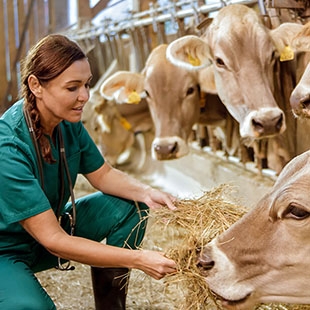Veterinary priorities included in House, Senate farm bills
 In June, the U.S. House of Representatives and U.S. Senate passed their respective versions of the Farm Bill. AVMA has been working closely with Congress on these bills, both of which include many of AVMA’s animal health priorities. Next, the House and Senate will meet to reconcile differences in the bills before a final version can be sent to the president’s desk for signature.
In June, the U.S. House of Representatives and U.S. Senate passed their respective versions of the Farm Bill. AVMA has been working closely with Congress on these bills, both of which include many of AVMA’s animal health priorities. Next, the House and Senate will meet to reconcile differences in the bills before a final version can be sent to the president’s desk for signature.
The Farm Bill, passed every five years, is a broad-reaching piece of legislation that governs federal investment in U.S. agriculture and nutrition – including veterinary programs such as the Food Animal Residue Avoidance Databank, and grants that fund veterinary colleges and support cutting-edge animal disease research. Previous Farm Bills have given us programs such as the Veterinary Medicine Loan Repayment and Veterinary Services Grant programs, which place and support food animal and public health veterinarians in federally designated veterinary shortage areas.
This year’s legislation also offers an important chance to authorize new, complementary programs to improve our national disease detection and response capabilities. We’re grateful to the animal health champions in both the House and Senate who have worked to include these in both bills. AVMA is asking Congress to take a three-pronged approach to animal health by:
- Establishing and funding an Animal Pest, Disease and Disaster Prevention and Response Program
- Providing full funding for the National Animal Health Laboratory Network
- Creating and funding a National Livestock Vaccine Bank with immediate priority to foot-and-mouth disease
Together, these programs facilitate a proactive approach to animal diseases so we can help prevent isolated incidences of disease from becoming widespread outbreaks. Through this structure, veterinarians would be better able to work with state officials and the U.S. Department of Agriculture to couple their expertise with the capabilities of our nation’s premier early warning system for animal disease, the National Animal Health Laboratory Network. A robust high-consequence animal disease vaccine bank also is needed to help us respond quickly and appropriately to disease outbreaks.
The House and Senate bills differ in their authorizations and funding for all three of our key animal health priorities, in addition to other animal health and research provisions. As the Senate and House negotiate the final version of the Farm Bill, we’re working closely with lawmakers to champion these programs and ask for the funding necessary for their success.
Congress needs to pass a Farm Bill before Sept. 30, 2018, to ensure current funding and authorizations don’t expire and to take new steps to preserve animal health.



Comments
Add New Comment